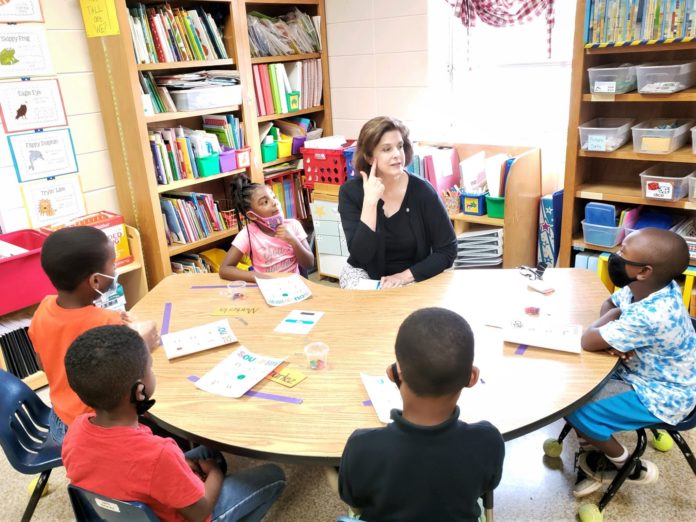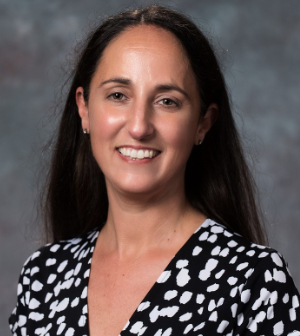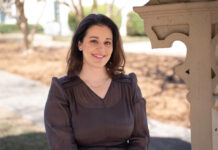
Two Mercer University graduates are among 10 finalists for the 2022 Georgia Teacher of the Year.
Jennifer Hawthorne Smith earned her undergraduate degree in communications from the Tift College of Education in 1989, and Cherie Bonder Dennis earned a Specialist in Education degree from the College in 2019.

Today, Smith is a kindergarten teacher at Jeffersonville Elementary School, where she’s been teaching for five years. Dennis teaches English to Speakers of Other Languages (ESOL) at Hesse K-8 School in Savannah and has been there 10 years.
Although they had different paths to teaching, both said their Mercer education helped them in their careers.
Teaching the basics
Smith started teaching about 15 years ago when the youngest of her four children started kindergarten.
“I’d been a stay-at-home mother, which was a wonderful experience. I loved every minute of it, but once our daughter was in in school, I wanted to do something that would allow me to have summers and holidays with my children,” she said.
Inspired by her mother, Dr. Sarah Beck Hawthorne, a Mercer graduate and teacher, Smith got her teaching certificate. Later, she earned a master’s in education from Georgia College & State University. (Her father, Fleming Hawthorne, also is a Mercer alumnus.)
When she entered the classroom, Smith took lessons from Mercer with her.
“I was able to take what I learned at Mercer, even all those years later, and apply, when I began teaching, those good lessons that I learned there,” she said.
While some teachers shy away from teaching kindergarten, Smith embraces it.
“Kindergarten is such an important grade level because it’s a segue between pre-K, which is more of a social-emotional kind of experience for those children who’ve never been in a classroom before, moving them towards first grade, which is much, much more academic,” she said.
“And in all reality, kindergarten is much more academic than it used to be, but it’s a great time to lay those academic foundations for them because if they don’t really get those basics now, they will struggle later on.”
Smith said she enjoys kindergarteners and watching them grow throughout the year.
“They’re ready to learn; they’re eager to be at school; they want to listen; they really have a desire to follow directions — they don’t always do that, but you can reason with them and help them understand in a very, very basic way,” she said.
“And so I see it not only as exciting to be at this grade level, but I see this being very important.”
Growing English skills
Dennis said she always wanted to be a teacher, earning her undergraduate degree from Georgetown University, where she majored in Japanese and minored in language teaching. Then, she went to Stanford University, earning a Master of Arts in East Asian studies.
“After graduate school, I was supposed to go work for an organization in Washington, D.C., coordinating an exchange program between U.S. and Japanese high school students, but their grant fell through six weeks before I graduated,” she said. “It was almost summer by then, so I had a hard time finding a position teaching Japanese since they are not very common.
“Instead, I ended up in a career in advertising that started at an international advertising agency working on the Toyota account.”
After several years, when her son went to kindergarten, she decided to go back to school and get a teaching degree, earning a Master of Arts in teaching from Armstrong Atlantic State University, which is now part of Georgia Southern.
“I’ve been teaching ever since,” she said.
Dennis taught third grade at Hesse, before moving into her current role teaching ESOL. She’s part of a team of four teachers and one paraprofessional who work with about 200 ESOL students at the school.
Dennis primarily works with students in kindergarten through fifth grade. Most of the students she works with speak Spanish as their first language. She helps with their English skills, including speaking, listening, reading and writing.
“Depending on the English proficiency level of the student, we either work with them on their basic interpersonal communication skills, their academic language proficiency or a combination of both,” she said.
“I love my students. They are incredibly motivated and creative, and they just have such a desire to learn. I enjoy helping them grow into their English skills so that they can feel successful when English is required of them either inside or outside the classroom.”
Dennis started to become involved in the leadership team at Hesse, and she went to Mercer for her Specialist in Education degree to hone her skills as a teacher-leader, she said.
“It gave me some more tools for how to assist teachers with or coach them through what they are trying to accomplish in their classrooms, how to observe them, how to provide feedback,” she said. “And also on how to shepherd various projects through our school, beginning with the leadership team and beyond to the rest of our faculty.”
A challenge like no other
The teachers faced the biggest challenge of their teaching careers during the COVID-19 pandemic. Both of their school systems held virtual classes for at least part of the year.
“When we taught virtually, that was the first time I think I’ve ever just completely drawn a blank,” Smith said. “How in the world do you teach kindergarten virtually?”
Kindergartners have short attention spans, so it was important to catch their attention and give them something to do at all times. Smith became proficient at Google Slides, Google Meet and other technology, coming up with interactive ways the children could participate at home.
“We would do scavenger hunts for math or scavenger hunts for ELA (English language arts), where they would have to go find something in the house for example,” she said. “Find something that there are seven of, and they go get straws or forks or something. …
“It was a real challenge, but I think we were able to pull it off.”
The virtual format was challenging for Dennis as well.
“It’s challenging to deliver the material and challenging to keep students engaged,” she said. “It’s just challenging to make sure that our students who are not coming in person stay connected and have the resources that they need to stay connected.”
Dennis said a collaborative effort among teachers helped meet students’ academic and personal needs.
For the ESOL team, “a lot of it was about making sure that we communicated with our families, that they remained connected to the school community. Everything from helping them find out how to get meals to helping them get free Wi-Fi,” she said.
State School Superintendent Richard Woods recognized the teachers’ work during the pandemic when announcing this year’s finalists.
“This is a group of creative, hardworking, talented teachers who pushed through great challenges this year to ensure students were still able to learn, connect and grow,” he said in a news release. “I am proud to call each of them my colleagues.”
The Georgia Teacher of the Year program did not name a winner last year due to the pandemic, so this year’s finalists were selected from the original 2021 cohort. The winner will be announced Aug. 7.









